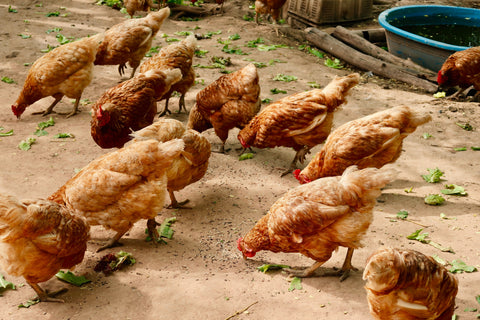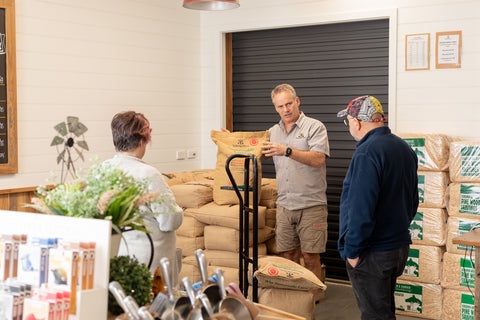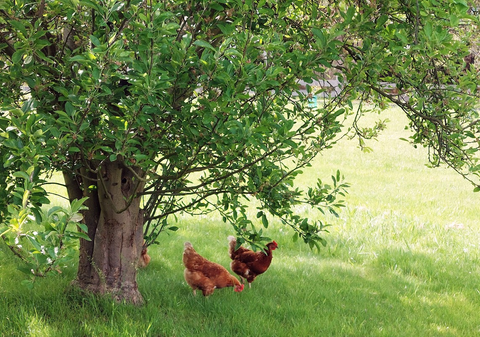Buying hens from a “chickens for sale” ad can be dangerous for the unprepared. There is no faster way to disappoint yourself and your family if you haven’t asked the right questions at purchase time and been caught out!
It doesn’t take long for some new chicken owners purchasing from a “chickens for sale” ad to discover just how much enjoyment and satisfaction they get from their own backyard hens. Not only are they great family pets but with the right feed and breed the hens can lay delicious daily eggs.
However, we often have new, first-time customers visiting us who have experienced heartbreak after buying from an ad. Problems have included hens that turned out to be roosters, breeds that were supposed to lay daily eggs laying weekly eggs, chickens that dropped dead within a week, and a variety of other problems.
Now, you can’t always avoid problems but asking the right questions combined with doing your research prior to purchasing your chickens goes a long way to reducing your risks and avoiding many of the pitfalls. In this post, I’ve created a list of the seven key questions to ask before you buy from an ad.
Q1: Do you guarantee the sex?
You need to be sure that you can return your chicken if you discover that one or more turn out to be roosters. Of course, you may intend to buy roosters and then discover eggs in your coop but either way, you want confirmation from the seller that you can return them if the sex is wrong.
The sex issue isn’t so much of a problem with the dedicated egg layers like the Hy-Line and ISA Brown chickens as they are bred so the roosters turn out white and hens are brown. It is the pure breeds that present a tougher challenge as the hens and roosters will often appear identical for months before showing signs that they are, in fact, of different sex. If you are after hens, make it very clear to the seller that you want to be able to return roosters if you discover that the ad promoting egg-laying chickens isn’t accurate.
Q2: Who have they mixed with?
Always ask the seller if there are other species of poultry on the property. This is very important as some species such as ducks and other waterfowl are good carriers for deadly diseases to laying hens such as Avian Influenza (H5N1).
Some sellers will have a wide range of poultry and other animals on the same property where they sell their chickens. As a rule, only buy from sellers who keep their chickens in separate flocks of the same age and species or else you are asking for trouble.
Q3: Are they guaranteed layers?
Assuming that one of the main reasons for you buying chickens from an ad is to get delicious, regular eggs then you’ll want a guarantee from the seller that is what will happen. The dedicated egg laying breeds (Hy-Line and ISA Brown hens), have very specific nutritional requirements for best performance. Because of this, if you are using the correct feed and doing everything right yet not getting eggs, you should expect to get your money back or replacement hens.
If buying young hens that have just started laying, your eggs should be small (50 or 60 gram eggs), with strong shells. On the other hand, if buying older hens, the eggs will be larger at around 80 to 85+ grams and have relatively weaker shells.
Q4: Are they vaccinated?
Vaccination is an important area that will leave you exposed to a range of sicknesses and diseases in your flock if not done correctly or not done at all. If you are buying pullets, which are hens that are around 16 to 20 weeks of age and have not yet started laying eggs, you will need to ask for confirmation that all standard vaccinations have been administered.
Fortunately, if you buy genuine ISA Brown or Hy-Line Brown laying hens, Baiada (the company that sells the ISA Brown) and Hy-Line’s contracted pullet growers will have completed all the vaccination work already. You will just need to confirm this by asking to see a list of vaccinations that they were given which are detailed in the flock’s Batch Management Plan (compulsory for growers to complete).
If you decide to buy day-old ISA or Hy-Line chicks, you will need to complete all vaccinations yourself according to the Baiada or Hy-Line grower manual.
If you are buying a pure breed of chicken such as an Australorp, Silkie or Langshan you will need to be more careful as anyone with a little knowledge and fertile eggs can breed them. Good breeders who sell their chickens will have a vaccination program in place and be able to show it to you but the bad breeders will just tell you it has been done and provide no evidence. Non-vaccination is a practice which saves the breeder time, effort and money and can often be reflected in a cheaper price but you will end up paying the price of a suffering or dead chicken when a common poultry disease comes along.
Q5: Are they genuine?
There are plenty of “chickens for sale” ads advertising the commercial egg laying Hy-Line and ISA Brown hens in Australia when they actually aren’t. Both Hy-Line and Baiada have large investments in time and money in either their own breeding programs or exclusive licence arrangements with the breeders which legally protect their respective breeds in law. Only Hy-Line or Baiada sell the Hy-Line and ISA Brown chickens in Australia and it’s illegal to breed from their stock or use their brand names incorrectly.
Of course, this doesn’t stop bad chicken breeders from crossing different breeds of chicken such as the Rhode Island Red, Australorp, and White Leghorn (all good egg laying chickens), so that they look like a Hy-Line or ISA brown. The problem however, is that breeding is not a simple process and you will be very unlikely to receive a hen that will lay anywhere near as well as a genuine Hy-Line or ISA Brown.
The easiest way to confirm if you are buying a genuine ISA or Hy-Line laying hen is to ask to see the respective company logo on the documentation supplied with the flock it came from. Failing that, ask for the name of the sales representative who originally sold them the hens and/or contact the company directly.
Q6: Is their health guaranteed?
When you first get your new chickens home the last thing you want to discover is that they get sick or die in the first month. Now, there are a wide range of poultry diseases that can affect chickens but you need the peace of mind to know that if you get unlucky, you don’t have to fork out more cash to get replacements.
If you have children, it can also be very sad for them to lose their new pets that they’ve bonded with – and they do make very good pets! If your chicken seller offers you a guarantee on the health of your new flock then that’s a pretty good sign that they are confident that they have done everything possible (such as vaccinations) to maximise their health.
Q7: What have they been fed?
Finally, what your potential new hens have been fed makes a big difference to their egg laying performance over their lifetime. When growing from a day-old chick to a point-of-lay pullet at around 18 weeks of age, any problems with feed or feeding can cause long-term issues.
These days, the egg-laying chickens such as the Hy-Line and ISA Brown hens have very specific nutritional requirements for each growth stage of their life. Being fed lower-grade or incorrect feed can often be a lot cheaper for a bad breeder or chicken seller but will cause problems for you, the long-term keeper of the hen/s.
If you have decided on a chicken seller and are at their property, always ask to see the feed that they are currently being fed and the brand. If it is a widely available commercial feed then it is likely to be inadequate for good quality egg production from good egg birds. Take extra care if you discover the seller is feeding their hens pellets as no egg farmer that I know in Victoria uses pellets due to wastage and lower feed conversion rates.
By asking these seven key questions before buying from a “chickens for sale” ad you stand a very good chance of buying the best quality chickens that lay the best quality eggs for you and your family. If you want to be even more prepared, download our free Beginner’s Guide to Backyard Chickens ebook, which will teach you all that you need to know about keeping healthy backyard chickens.







Comments (0)
There are no comments for this article. Be the first one to leave a message!